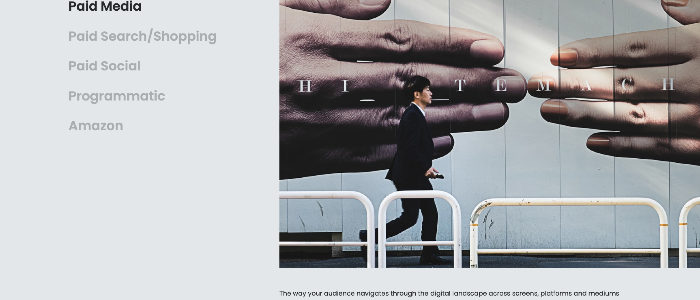
How to Choose The Right PPC Agency
In 2017, PPC advertisers invested over $10 billion dollars.
If you stacked that many $100 dollar bills on top of each other, you’d have a nearly seven-mile tall tower of money. So, that’s a TON of money.
But year after year, global ad spend across every major PPC channel is growing even higher.
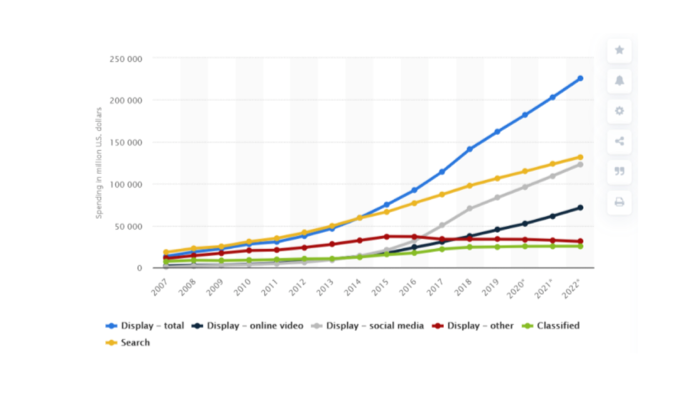
Source: Statistica
And this explosive growth isn’t happening for no reason.
It’s happening because PPC works. It’s the classic “spend money to make money” model. From social media to paid search, PPC is a smart way to see quick results.
But that’s only true if you know what you’re doing.
Which… is where an experienced PPC agency comes in. They spend countless hours experimenting and learning everything there is to know so you don’t have to.
So if you’re looking to hire an agency to create and manage your PPC campaigns but aren’t sure where to start, you’re in the right place. In this article, I cover:
- What to look for in a PPC agency
- How to work with them for maximum results
- Steps to finding the right agency
- My top five recommendations
Let’s dive in!
Know your goals and desired outcomes
PPC campaigns exist for a wide variety of reasons. And it’s crucial to have a clear picture of what you hope to achieve before you go through the process of finding the right PPC agency.
Without this essential set of information, you’ll have a hard time making an educated decision.
So before you get started, sit down with your team and set clear goals and expectations. There aren’t any right or wrong answers, but it’s good to understand this from the get-go.
Your goals may include:
- Adding more qualified leads to your automated sales funnel
- Selling more of a specific product or category of products
- Increasing the number of visitors to a landing page
- Building awareness for your brand
Right now, you need to set an overall goal for your next campaign. Understanding your expectations makes it easier to communicate what you’re after and ensures everyone’s on the same page.
The idea is to reach a high-level agreement on why you want to hire a PPC agency.
You should also consider the level of participation you want to have throughout the process. Do you want to be super hands-on, or are you hoping for someone to completely take over?
Lastly, don’t worry about the finer details just yet. You can work through the specific metrics and KPIs you want to measure later when you actually sit down with your new PPC partner.
7 characteristics that make a great PPC agency
Now you have a crystal clear picture of your goals, expectations, and level of participation. So it’s time to start talking about what characteristics to look for.
Not all PPC agencies are equal. Some excel at specific advertising types, while others specialize in creating excellent customer experiences across every platform.
One isn’t necessarily better than the other, but it ultimately depends on what you’re looking for.
So use these characteristics as a baseline for creating a list of viable options. They’ll help you narrow your choices down to those PPC agencies that are worth every penny.
From there, you can sit down with them before making a final decision.
Let’s get started!
1. They value data, analytics, and results
PPC is an exciting form of digital marketing because you can directly tie revenue generated to ad spend. So data and analytics are crucial to the success of future campaigns.
The best PPC agencies understand how to use numbers to strategize new ideas that improve your overall ROI. They use what they already know and what they learn about your target market to develop high-yield campaigns.
Furthermore, they also understand the importance of collecting as much information as possible as well as sharing that data with you.
If it’s not clear on their website, be sure to ask questions to help you gauge this before working together. You can ask things like:
- What tools do you use to measure essential PPC metrics?
- Will you actively share data and results with us?
- Do I have independent access to analytics and reporting?
- Is a full analytics report included with your offer?
- If so, what do you include in those reports?
2. Strategic partnerships and first-party data sources
The longer you’re in business, and the more campaigns you run, the more first-party data you gather about your specific audience and how they behave.
But the best PPC agencies have an extensive database of their own first-party data as well.
Furthermore, they know how to use it to predict your audience’s buying behavior based on similar industries and past clients. And they may also connect with first-party data sources to tap into their pool of information as well.
Aside from data, smart agencies partner with leading search and social media platforms. Partners are the first to know about new changes and updates.
This means they’re ahead of the game when things change.
Which… seems to happen by the second. So, these strategic partnerships give PPC agencies in-depth insight non-partners don’t have.
Look for indications of this on their website or ask about it if you’re unsure.
3. Knowledge of local search
82% of smartphone users turn to search engines to find businesses close to them. They use phrases like “near me” to decide where to eat lunch, go shopping, and find entertainment, among other things as well.
Furthermore, 76% of those searches lead to an in-store visit on the same day.
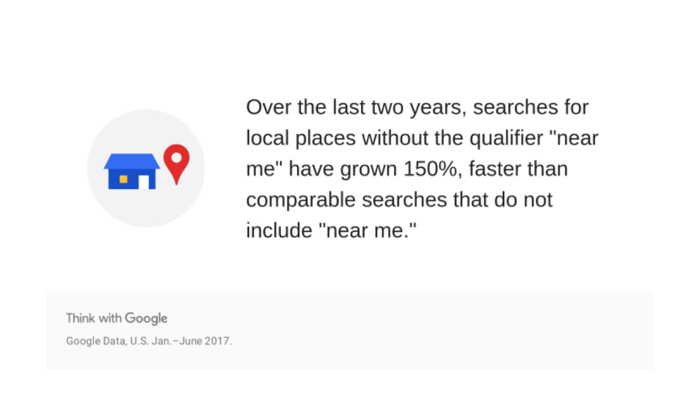
Source: Think With Google
So, local search isn’t something your business can afford to ignore if you want to drive foot traffic to a physical location.
Whether you use your business to sell products or meet with clients, it’s crucial to show up in search results at the right time.
Make sure to choose an agency with a strong knowledge of local search (both paid and organic). You may not be able to find this information on their website, so be sure to ask questions.
During your first call, it may help to ask things like:
- How do you approach local paid search objectives?
- Can you share any local PPC results you’ve produced for similar businesses?
- We want to reach our local community. Can you tell me a bit about how that works?
- How do you measure the success of location-based keywords?
- Do you use bid modifiers for location-specific queries?
4. Strong mobile optimization capabilities
Mobile devices account for over half (53%) of clicks on search ads. The era of designing creatives and writing copy for desktop first… is over.
It’s more important than ever before for PPC ads to be easily accessible on devices of all sizes.
And the world of mobile optimization is tricky, especially when combined with ever-changing search and social algorithms. So it’s crucial to hire a PPC agency that knows how to tackle this transition to on-the-go browsing.
Some agencies may highlight this as a feature on their website, while others may not. So be sure to ask questions during your initial phone calls to ensure they know their stuff.
To gauge this, you can ask things like:
- Can you share any mobile-specific results for previous campaigns?
- What’re your thoughts on designing PPC ads for mobile rather than desktop?
- Do you provide mobile-optimized copy and display ads, or suggestions to improve them?
- Do you leverage bid modifiers for mobile devices?
5. They focus on the right PPC channels
Whether you’re interested in search, social, programmatic, shopping, or multi-channel PPC campaigns, it’s essential to find a PPC agency specializing in the platforms you want to use.
There’s no right or wrong marketing channel. But it does depend on your end goal.
Some agencies may only manage search campaigns while others may consult, design, and manage paid social media campaigns. No two campaigns are alike, nor are two PPC agencies.
So first, you have to understand what you’re looking for.
What channels are you considering? Do you need help with design or ad copy as well? Maybe you want a collaborative project, or perhaps you prefer entirely hands-off.
Decide what you need and expect from a PPC agency and use that to guide your decision.
Be sure to sare your expectations and goals during your first meeting to ensure they’re a good fit.
6. Impeccable keyword research
The quickest way to see a return on your investment is by targeting commercial-intent (transactional) keywords. People searching for things like “Buy iPhone X” or “best web hosting services” are ready to buy.
But making more money isn’t the only goal behind PPC advertising. Maybe you want to grow your email list to add more leads into your sales funnel. Or raise brand awareness. Or drive traffic to help increase ad revenue.
Regardless of the end goal, your PPC agency must understand your campaign’s purpose and help you choose appropriate keywords to target.
This isn’t something you can usually find on their website. So you’ll have to do some digging.
Here are some great questions to ask during your first call:
- How do you decide what keywords to focus on?
- What keyword research tools do you use?
- Can you tell us about your keyword strategy for a similar business?
- What metrics do you use to decide if a keyword is performing well?
7. Well-versed in all things digital marketing
PPC advertising doesn’t exist in a vacuum.
It’s usually a small piece of a broader digital marketing strategy.
And the best PPC agencies know this and work to create effective campaigns and PPC strategies to support your high-level business goals.
Sure, PPC requires strong keywords that target the right audiences. But it goes much further than that as well.
Great agencies understand the big picture and oftentimes can help improve other pieces of your digital marketing system because they’re great marketers themselves.
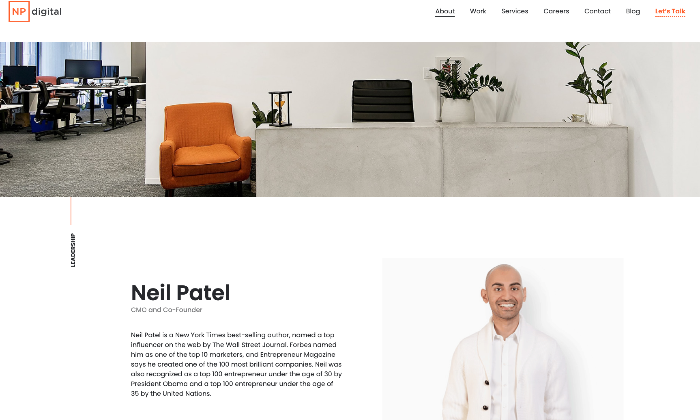
How to work with a PPC agency
Now you know what to look for in a PPC agency.
But if you’ve never worked with one before, you may feel unsure of what to expect going into your new partnership. And there are several things you can do as a client to enhance the overall experience.
Doing these things helps put both your business and your agency in a strong position for success.
Set clear goals and communicate your expectations
We talked about this briefly at the beginning of this article, but I want to come back to it again because it’s so important.
Your goals and expectations set the stage for the rest of your partnership.
It’s critical to understand your goals and communicate them with your PPC agency. The best agencies use your goals and expectations to develop a strategic plan that works well for both of you.
So if you’re hesitant or unsure of what you’re after, sit down with your team and revisit this. And make sure you know how to communicate what you want.
Gather and share data from past campaigns
Any first-party data you have can significantly impact the outcome of future campaigns.
Think back to previous partnerships or campaigns you’ve run and gather that information into a clean and easy-to-understand report.
Then, share it with your agency.
Hard data is the best way for them to learn more about your audience’s attributes and behaviors as well as what worked, what didn’t, and why.
This way, they don’t have to reinvent the wheel or start their research from scratch.
Choose one point of contact
To avoid confusion, choose one central point of contact for communications from your agency. This ensures there are no miscommunications or wasted time from several people managing that relationship.
You can certainly have a team working on the project but limit communications to one person.
It also helps simplify things for your agency as well. They always know who to talk to, and they don’t have to worry about waiting too long for your response.
Be prepared for advice and suggestions
PPC agencies are excellent at what they do, so it’s essential to listen to their advice and suggestions. This could be advice on improving your home page for conversions or redesigning landing pages to increase sales.
Perhaps it’s a suggestion to improve your ad copy or headline.
Always remember they’re the experts, and you hired them for a reason — they know their stuff. So take the time to listen and keep an open mind throughout the process.
Ask all the questions you need to ask
There’s no such thing as a stupid question. And there’s no such thing as too many questions, either. If you’re unsure or confused about anything, the best thing to do is ask.
There’s nothing wrong with not knowing, but there is something wrong with not asking about it.
This helps you learn, and it also helps clear up any confusion about the project. You can rest easy every day, understanding the hows and whys of your campaign.
How to find the right PPC agency for you
There are hundreds (if not more) of PPC agencies to choose from. And choosing the right one is often the hardest part of getting started.
But the best PPC agencies for you specialize in the types of campaigns you’re interested in. They should also have in-depth knowledge of your specific industry. These characteristics combined help pave the way for the best results.
It may also help to make a list of your expectations and requirements before starting your search.
From there, list the companies you’re considering. Be sure to include:
- Their specialty areas
- What makes them stand out to you
- Why they seem like a good fit
- Pricing if it’s available online
- Any negatives about their business
Then you can use your requirements and expectations to cross off agencies that don’t match what you need. Lastly, schedule a call with the remaining agencies on your list.
This is your chance to interview them just as much as it’s their chance to interview you.
So ask all your questions and take notes throughout the meeting so you can come back to them when making a final decision.
The 5 top PPC agencies
Now you know what to look for, what to expect, and how to decide.
Here are my top PPC agency recommendations for different business types and sizes to kick off your search.
1. Neil Patel Digital — Best multi-channel PPC company
At NPDigital, we leverage our first-party data and search partners to create multi-channel campaigns designed to meet potential customers wherever they hang out online.
Furthermore, we focus on using data to design an excellent customer experience regardless of how and where they interact with your brand.
And now more than ever, consumers are researching before they buy.
We care about giving shoppers the content and information they need to make informed decisions, all while helping you conquer your PPC goals.
From paid search and social media to Amazon and shopping ads, your PPC campaigns are in good hands.
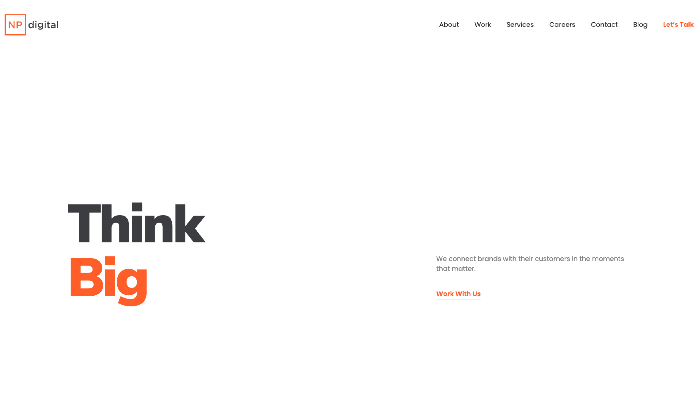
2. Loud Mouth Media — Best small agency in the UK
Hiring a partner close to your time zone can have a massive impact on the type of communication you have as well as how long it takes to get a response.
If you’re in Europe or the UK, Loud Mouth Media is an excellent small PPC agency serving big clients like Volvo and BBC, as well as small businesses around the world.
And there’s a reason Loud Mouth Media’s won the “Best Small PPC Agency” in the UK two years in a row — they’re phenomenal at what they do.
With the data and results to back it up.
Plus, they’re Google, Bing, and Facebook partners, so Loud Mouth Media is an excellent choice if you’re interested in those channels.
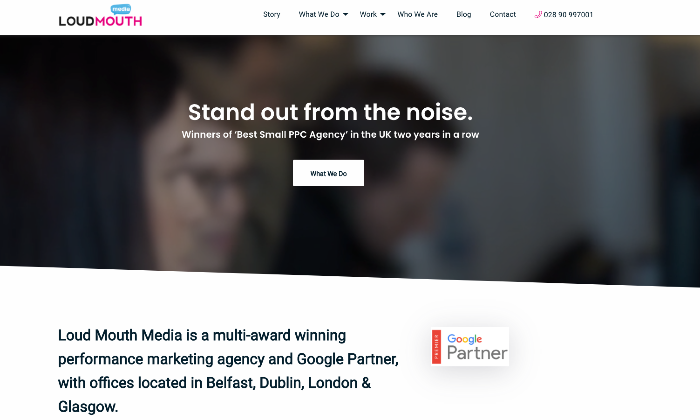
3. Stryde — Best for eCommerce and B2C businesses
If you’re a B2C business or running an eCommerce store, Stryde is a superb choice because they specialize in eCommerce digital marketing for businesses of all sizes.
Furthermore, the B2B and B2C industries couldn’t’ be more different when it comes to PPC.
And there’s no one better to strategize and manage your product-focused campaigns than an agency that solely works with eCommerce and B2C businesses.
Plus, they have an extensive portfolio of case studies that prove they’re great at what they do.
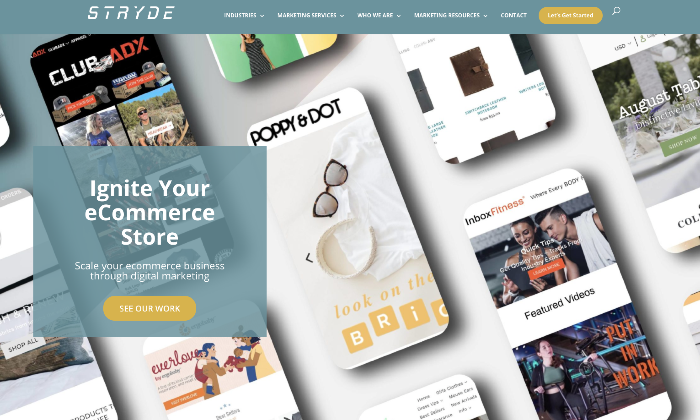
4. KlientBoost — Best for landing page design + management services
PPC ads drive traffic, and landing pages (typically) convert that traffic into revenue or leads.
So it’s no surprise that landing page design and optimization are crucial to successful PPC campaigns regardless of your industry and business type.
If you don’t have an in-house designer or struggle with creating conversion-focused landing pages, KlientBoost is an excellent PPC partner for your business.
Aside from PPC and social media management, they also specialize in designing new landing pages and optimizing existing ones to help you reach and exceed your PPC goals.
Their in-house team of designers and developers is ready to help you craft excellent customer experiences from their first click to their last.
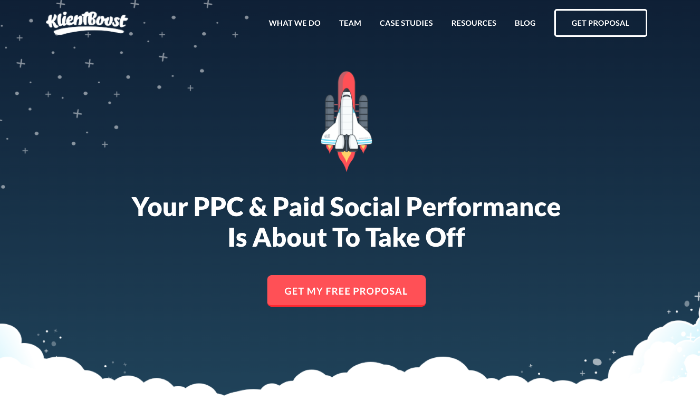
5. Directive Consulting — Best for SaaS and B2B businesses
B2B businesses and SaaS tools face their own set of unique challenges when it comes to PPC campaigns. After all, you’re targeting other businesses… not individuals.
So you need a PPC strategist and partner that understands how to overcome those challenges.
Directive Consulting specializes in helping software companies conquer every marketing channel from paid search and shopping ads to SEO and CRO.
Whether you’re looking solely for PPC or interested in an entire digital marketing plan from one of the top agencies around, Directive is a fantastic choice. Plus, they offer digital marketing education, and they have a pool of first-party SaaS data you can tap into.
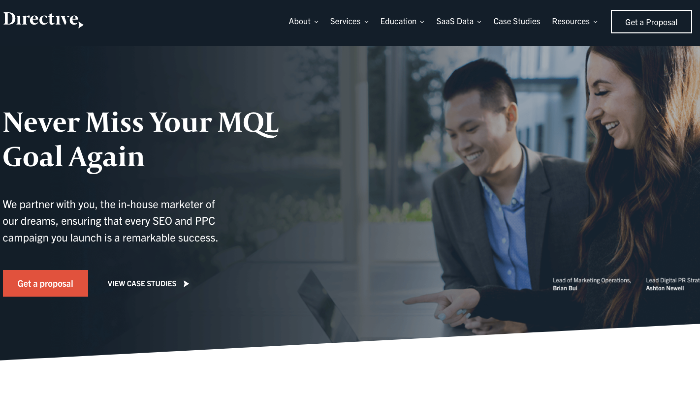
You + the right agency = reliable results
Choosing the best PPC agency for your business is just as important as crafting the perfect copy, designing eye-catching creatives, and publishing conversion-focused landing pages.
There’s no doubt you have a powerful message and life-changing products for the right audience. Plus, you owe it to them to put it in front of them when they need it.
The right PPC agency helps you do just that while helping you generate more leads, make more money, and get more eyes on your brand. It’s a win-win for everyone involved.
The good news is that you now know what to look for throughout the process. So next time you’re looking for your dream PPC agency, use the tips, tricks, and characteristics we talked about.
And remember: an excellent PPC partner and reliable results can make a world of difference for your business. You deserve it and your customers do too.
What do you look for when hiring a PPC agency?
The post How to Choose The Right PPC Agency appeared first on Neil Patel.
